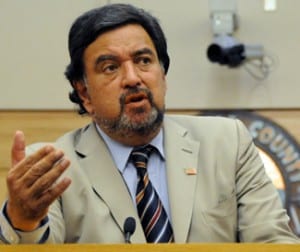
Heath Haussamen / NMPolitics.net
Former Gov. Bill Richardson (Photo by Heath Haussamen)
I do not know Judge Murphy and I have no idea whether the allegations against him are true, but as one of Governor Bill Richardson’s former chief counsels, I can tell you that the governor cared deeply about making good judicial appointments.
Sure we made some mistakes. But by and large, our vetting and selection process worked. Governor Richardson appointed some great judges, from the magistrate courts to the Supreme Court. Many times he bucked conventional wisdom and appointed candidates who were not well known and had no political clout, only because he thought they were the most qualified and would do the best job.
The governor’s judicial selection process involved painstaking research into the backgrounds and qualifications of the candidates. We checked court and criminal records, reviewed financial records, compiled input from the public, and personally interviewed candidates. The governor asked every candidate about his or her views on important issues, like DWI and domestic violence.
I suspect that some of the people the governor appointed made campaign contributions and others did not. I never once checked whether a candidate made a campaign contribution to the governor or the Democratic Party, and the governor never asked me to do so.
Of course we knew the party affiliation of a particular candidate. These are political appointments, after all. And while most appointees were Democrats, some were Republicans.

Vincent Ward
Panel recommends only qualified candidates
Also, before the governor ever interviewed an applicant (except for the magistrate appointments, which are selected differently), the Judicial Nominating Commission, chaired by the dean of the University of New Mexico School of Law, screened the pool of applicants and recommended only the most qualified and deserving to the governor for his consideration.
The governor does not control the commission, contrary to various assertions. The commission, by law, is a bipartisan group with an equal number of representatives from the major political parties. The governor, the speaker of the House, and the president pro tem of the Senate each appoint lawyers and non-lawyers. The chief justice of the Supreme Court and other judges, depending on the vacancy, sit on the commission.
The State Bar president appoints additional members, when necessary, to ensure the commission is balanced politically. Moreover, commission interviews are open to the public, which gives members of the community the opportunity to hear for themselves the views and opinions of the judicial candidates.
Governor took appointment process seriously
I imagine the special prosecutor believes he has a solid case against Judge Murphy, and I have no reason to doubt his professionalism, integrity or motivations. In fact, it has been publicly reported that the special prosecutor himself made a small contribution to the governor’s re-election campaign.
Time will tell whether Judge Murphy or others mentioned in the special prosecutor’s report acted improperly. If they violated the law, they should be punished. But securing an indictment through a grand jury, without conviction, is meaningless. The point of our criminal justice system is not to secure indictments that make the front page of the paper and then fizzle when it turns out the case lacks merit.
I strongly disagree, however, with anyone who suggests that Governor Richardson exploited the judicial selection process to secure campaign contributions. My firsthand experience is that Governor Richardson took the job of appointing judges seriously and deliberated carefully about the merits of every judicial candidate he considered.
I believe the judiciary in New Mexico benefited greatly from Governor Richardson’s appointments, and am confident that the vast majority of his appointees are of impeccable character and will continue to carry out their duties ethically, honestly and fairly. That is what Governor Richardson expected of me, and it is all he ever asked of his judicial appointees.
Vincent Ward served in Governor Bill Richardson’s chief counsel office as both chief counsel (2008-09) and deputy chief counsel (2005-07). The Obama administration appointed him to a position at the Department of the Interior in 2009. He currently works in private practice in Albuquerque.
